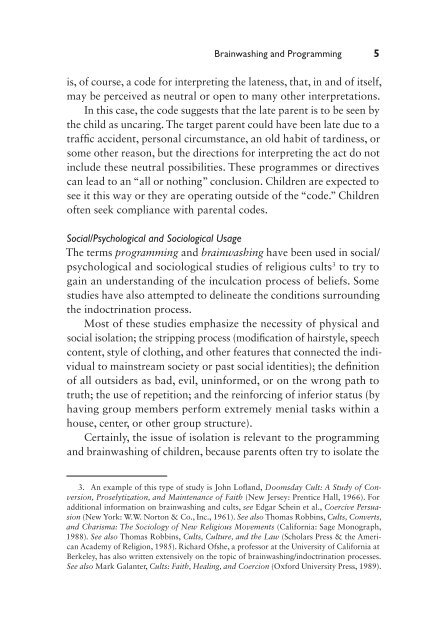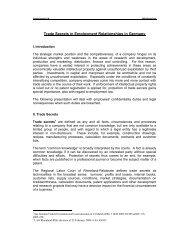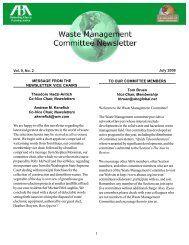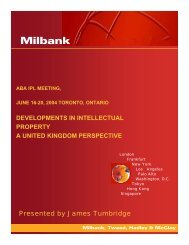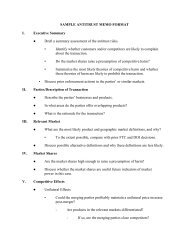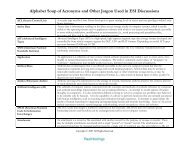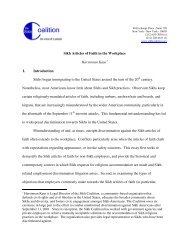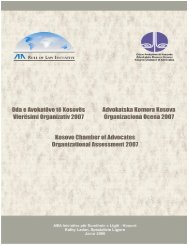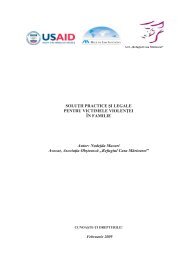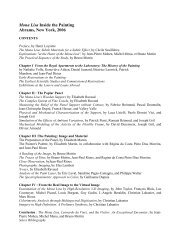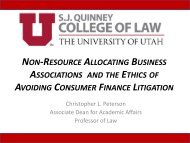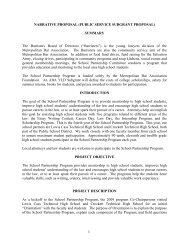Chapter 1 - American Bar Association
Chapter 1 - American Bar Association
Chapter 1 - American Bar Association
Create successful ePaper yourself
Turn your PDF publications into a flip-book with our unique Google optimized e-Paper software.
Brainwashing and Programming<br />
5<br />
is, of course, a code for interpreting the lateness, that, in and of itself,<br />
may be perceived as neutral or open to many other interpretations.<br />
In this case, the code suggests that the late parent is to be seen by<br />
the child as uncaring. The target parent could have been late due to a<br />
traffic accident, personal circumstance, an old habit of tardiness, or<br />
some other reason, but the directions for interpreting the act do not<br />
include these neutral possibilities. These programmes or directives<br />
can lead to an “all or nothing” conclusion. Children are expected to<br />
see it this way or they are operating outside of the “code.” Children<br />
often seek compliance with parental codes.<br />
Social/Psychological and Sociological Usage<br />
The terms programming and brainwashing have been used in social/<br />
psychological and sociological studies of religious cults 3 to try to<br />
gain an understanding of the inculcation process of beliefs. Some<br />
studies have also attempted to delineate the conditions surrounding<br />
the indoctrination process.<br />
Most of these studies emphasize the necessity of physical and<br />
social isolation; the stripping process (modification of hairstyle, speech<br />
content, style of clothing, and other features that connected the individual<br />
to mainstream society or past social identities); the definition<br />
of all outsiders as bad, evil, uninformed, or on the wrong path to<br />
truth; the use of repetition; and the reinforcing of inferior status (by<br />
having group members perform extremely menial tasks within a<br />
house, center, or other group structure).<br />
Certainly, the issue of isolation is relevant to the programming<br />
and brainwashing of children, because parents often try to isolate the<br />
3. An example of this type of study is John Lofland, Doomsday Cult: A Study of Conversion,<br />
Proselytization, and Maintenance of Faith (New Jersey: Prentice Hall, 1966). For<br />
additional information on brainwashing and cults, see Edgar Schein et al., Coercive Persuasion<br />
(New York: W.W. Norton & Co., Inc., 1961). See also Thomas Robbins, Cults, Converts,<br />
and Charisma: The Sociology of New Religious Movements (California: Sage Monograph,<br />
1988). See also Thomas Robbins, Cults, Culture, and the Law (Scholars Press & the <strong>American</strong><br />
Academy of Religion, 1985). Richard Ofshe, a professor at the University of California at<br />
Berkeley, has also written extensively on the topic of brainwashing/indoctrination processes.<br />
See also Mark Galanter, Cults: Faith, Healing, and Coercion (Oxford University Press, 1989).


